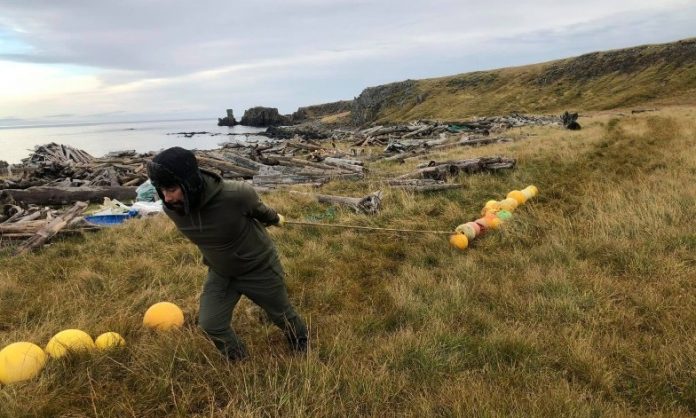The only book ever published about the Bay of Kolgrafarvíkwas is called ‘The End of the Road’, which gives you a good idea about its isolation in a remote area of sparsely populated Iceland.
Located on the eastern part of the vast Westfjord-peninsula, it was for centuries the last stop for drift-wood floating westwards from Siberia in the currents of the North-Atlantic. Now, thanks to modern technology fewer felled trees escape from Russian loggers into the ocean, but another product of modern times – plastic – has replaced wood.

The end of the road for driftwood and plastic: Kolgrafarvík in Iceland. Photo: HJ
Kolfgrafarvík has become the end of the road for some of the 8 million metric tons of plastic that are thrown into the world’s oceans annually according to a 2016 study published by the World Economic Forum.
Global solution to a global problem
An army of International volunteers has, for the past few months, joined forces with the author of ‘The End of the Road’, Hrafn Jökulsson, in a fight against plastic on the shores of this region.
 A global problem requires global solutions. And Jökulsson’s army is truly global. The NGO Worldwide friends has provided international foot-soldiers. When UNRIC interviewed “General” Jökulsson, his anti-plastic army included newlywed Sebastian, a 26-year-old Italian-educated Guatemalan and Vlada his Russian/Ukrainian wife and 24-year-old Konstantina, fresh from graduating as a medical doctor in Greece.
A global problem requires global solutions. And Jökulsson’s army is truly global. The NGO Worldwide friends has provided international foot-soldiers. When UNRIC interviewed “General” Jökulsson, his anti-plastic army included newlywed Sebastian, a 26-year-old Italian-educated Guatemalan and Vlada his Russian/Ukrainian wife and 24-year-old Konstantina, fresh from graduating as a medical doctor in Greece.
Last spring Jökulsson, a well-known 54-year-old Icelandic journalist, Greenland-lover and chess promoter, visited Kolgrafarvík, where he had spent summer vacations on a farm in his youth.
“I returned to my beloved Kolgrafarvík on 11 May this spring,” Jökulsson told UNRIC. “It was 46 years since my first visit as an 8-year-old farmhand. Back in the day, Siberian driftwood was the main resource of people in this far-away region of Strandasýsla, one of the poorest in Iceland.”
Siberian driftwood
 Northern Europe, including Scandinavia, is known for its forest but the combined efforts of humans, sheep and volcanos have virtually destroyed any semblance of forests.
Northern Europe, including Scandinavia, is known for its forest but the combined efforts of humans, sheep and volcanos have virtually destroyed any semblance of forests.
For centuries the driftwood was used by local master-carpenters for farm equipment or decorations, not to mention firewood. They sold timber to other regions where it was used to build wooden cathedrals and homes.
But modern transport and the emerging world economy of import-export replaced driftwood brought by ocean currents from Siberia to the shores of Iceland, and most of the population moved away.
A disaster zone
“The driftwood had just piled up on the beaches,” Jökulsson recalls. “And in its midst is the invading army: plastic, fishing nets and rubbish, which penetrates the soil and becomes an ecological nightmare.”
“This beautiful bay opens its arms to the north and accepts all the world´s gifts – but no one had been attending to it. When I arrived this spring it looked like a disaster zone. Plastic and fishing nets all over the place. The adventure world of my youth had become a garbage scrap-heap.”
In a state of shock, Jökulsson pondered for a couple of days until he swore an oath: “I said: My dear Kolgrafarvík. I will devote myself for the next four years to reclaim my adventure-world, clean its beaches and all other beaches as long as I have any strength left.”
EU and UN join hands
 Jökulsson is not alone. The so-called Blue Army has spearheaded efforts in Iceland to clean up beaches for decades. Worldwide the United Nations has joined forces with the European Union. Every year in September, the EU organises an ocean-activism and awareness-raising campaign – #EUBeachCleanup. Last year, over 40,000 volunteers were mobilised in nearly 80 countries.
Jökulsson is not alone. The so-called Blue Army has spearheaded efforts in Iceland to clean up beaches for decades. Worldwide the United Nations has joined forces with the European Union. Every year in September, the EU organises an ocean-activism and awareness-raising campaign – #EUBeachCleanup. Last year, over 40,000 volunteers were mobilised in nearly 80 countries.
In 2017 The UN Environment Programme (UNEP) launched its #CleanSeas campaign which will address the root-cause of marine litter by targeting the production and consumption of non-recoverable and single-use plastic.
On World Environment Day in 2018, United Nations Secretary-General António Guterres stated that “from remote islands to the Artic, nowhere is untouched.” He said that the world must unite to “beat plastic pollution”, noting that microplastic particles in the ocean, “now outnumber stars in our galaxy”.
A spider in a Russian plastic tube
Meanwhile, Jökulsson and his international friends continue to do their part in cleaning up their micro-cosmos of Kolgrafarvík, where the plastics, indeed, sometimes seem to outnumber the stars in the galaxy.
“An innocent worm ends up in a Danish mustard can,” Jökulsson explains. “A spider errs into a plastic tube from a Russian industrial trawler, a ground-beetle is locked in an Icelandic beer bottle and a mouse is trapped in a plastic box of American dairy products. I have seen it all – I have seen all of these innocent victims of us – the human species. They are dying by the billions all over the world’s shorelines.”
For further information on #EUBeachCleanup see here.




